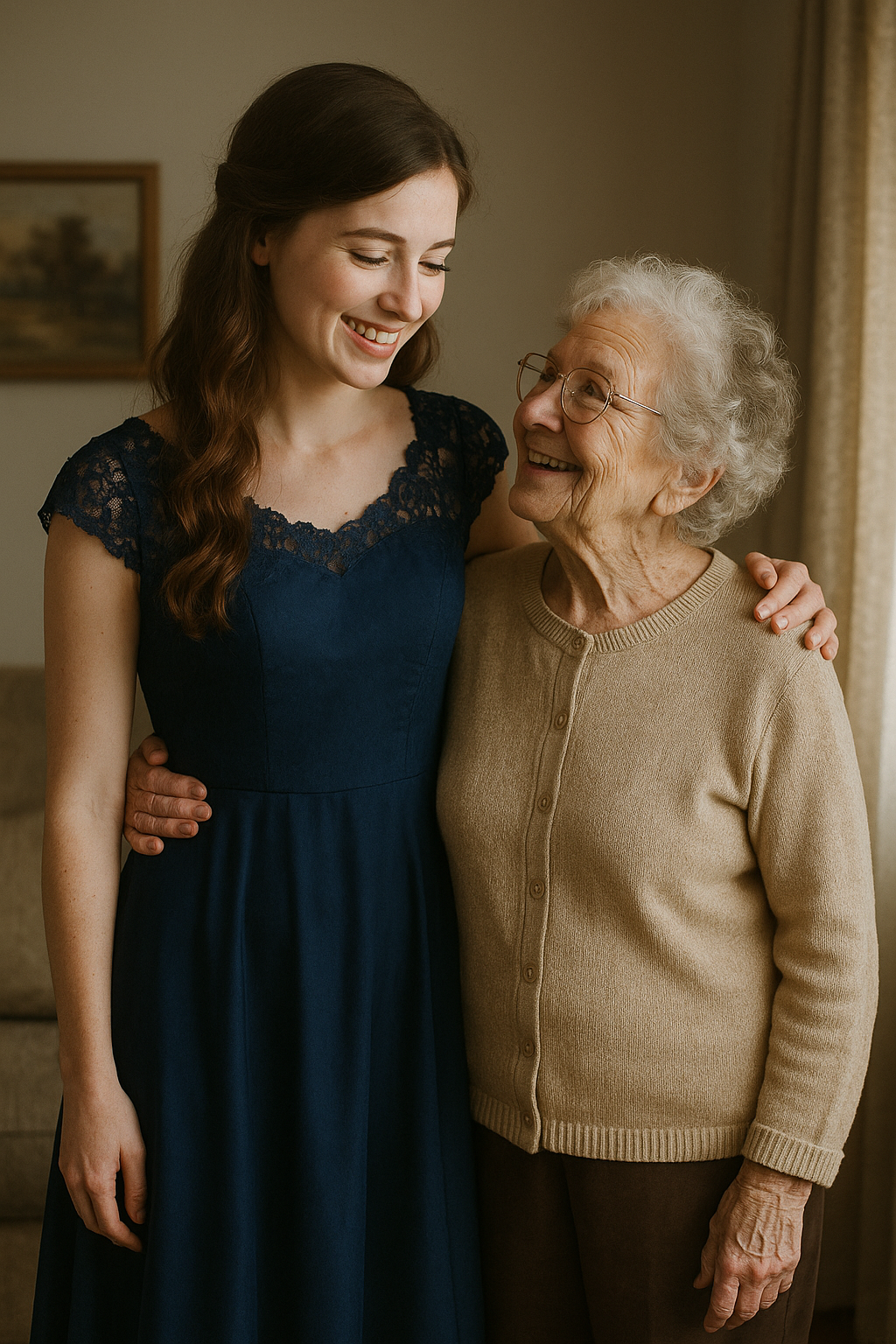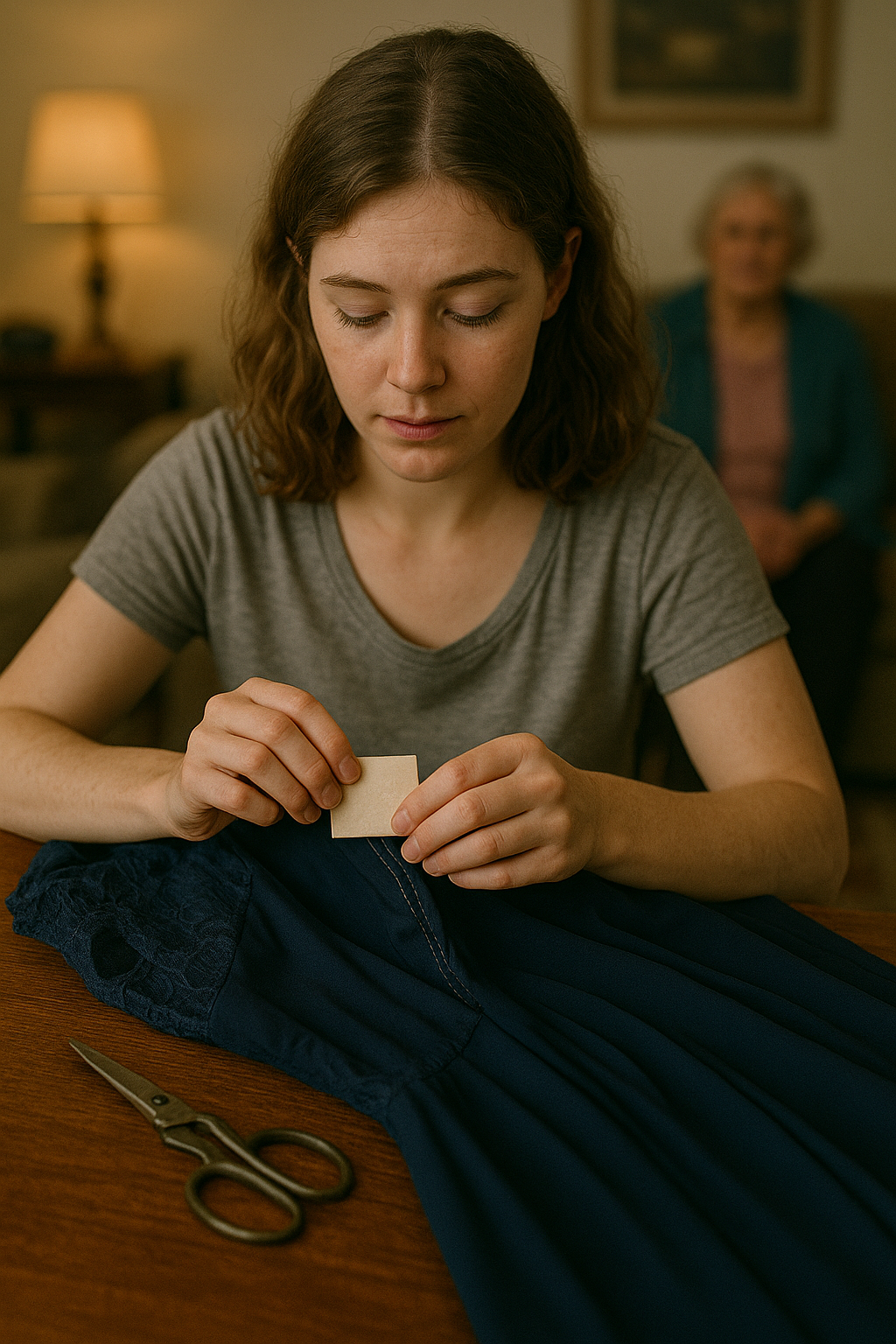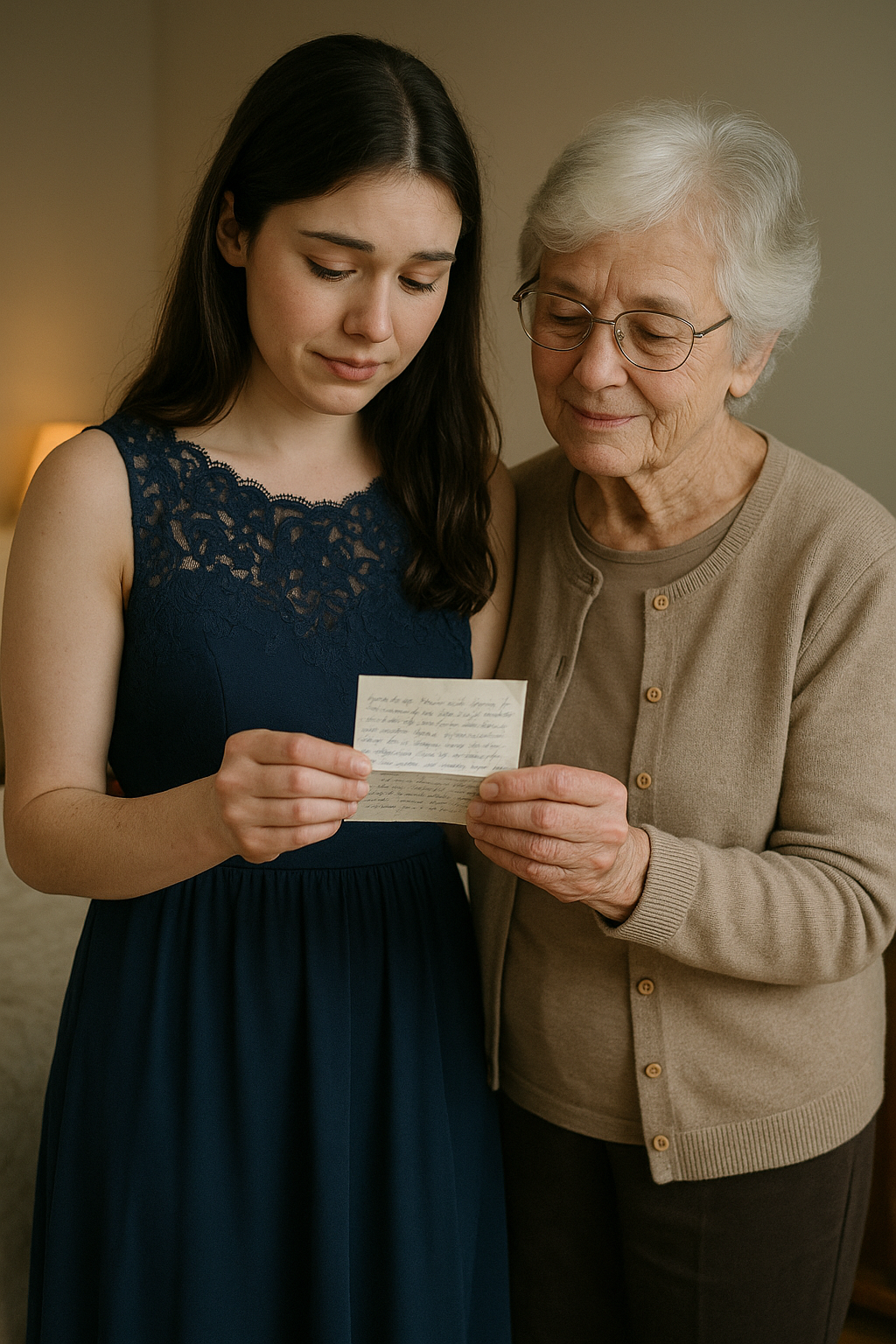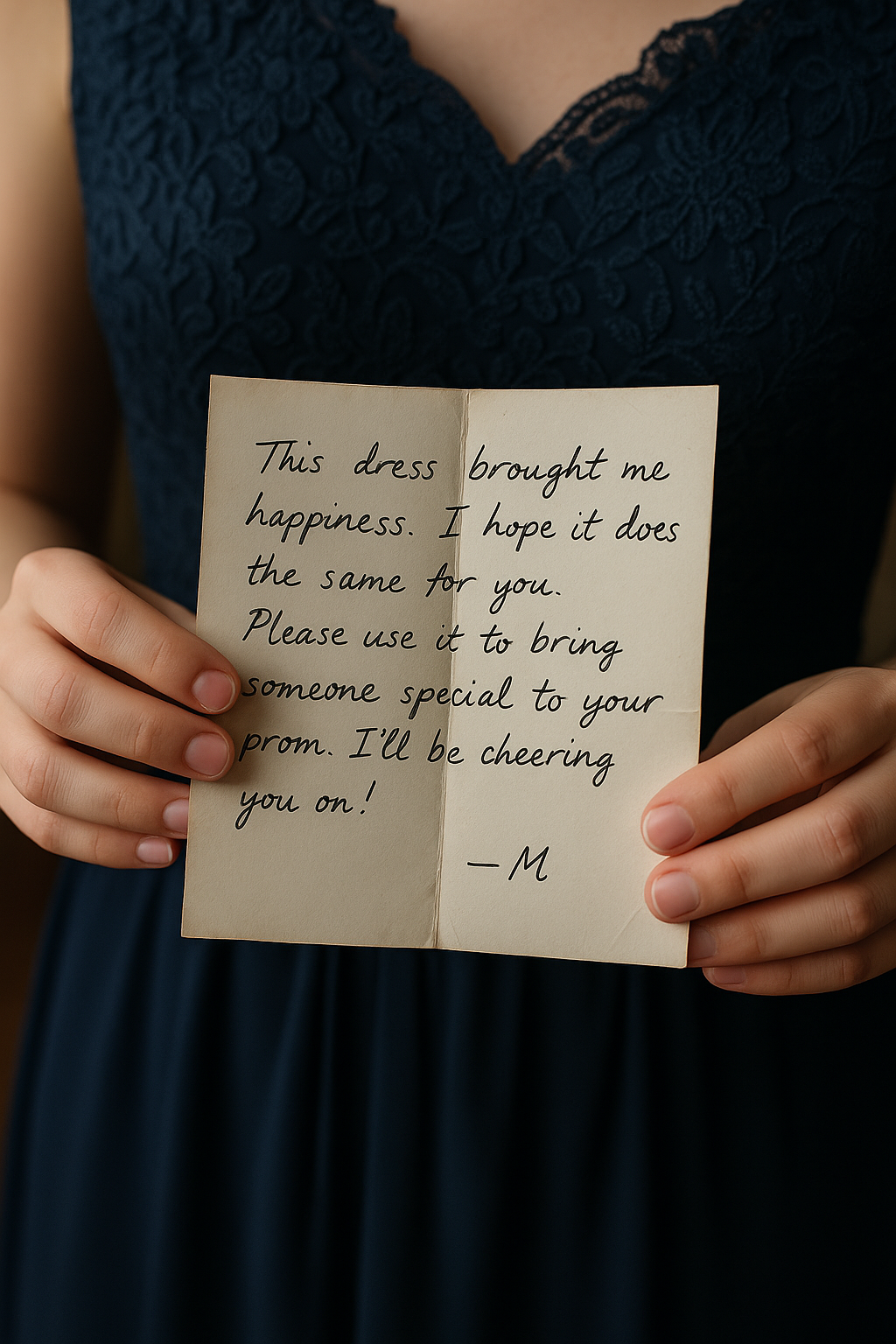I’ve always been the kind of girl who blends in more than stands out. My teachers used words like “promising,” “dedicated,” and “a quiet leader.” But while potential is nice, it doesn’t exactly pay for prom dresses—or college tuition.
My dad left when I was seven. Since then, it’s been just Mom, Grandma Rosie, and me. We’ve scraped by with love, secondhand furniture, and Grandma’s endless supply of wisdom and herbal tea. We didn’t have much, but we had enough. Still, prom felt out of reach—like something meant for other girls, not for someone like me.
So when our school announced the date, I didn’t even bother bringing it up. I knew we couldn’t afford a fancy gown, not with Mom juggling two part-time jobs and Grandma’s medical bills piling up.

But Grandma—she’s a miracle worker.
“You never know what treasure someone left behind,” she said one afternoon with a wink. “Let’s go hunting.”
She meant the thrift store, of course—her version of a department store. Over the years, I’d found all sorts of gems there: vintage blouses, nearly-new boots, even a leather satchel once that still had a department store tag. Grandma believed the universe had a way of sending us what we needed. That day, she was right again.
The moment I saw the dress, I froze.
It was deep navy, almost black under certain lights. Floor-length, with elegant lace across the shoulders and back. It looked untouched—no stains, no rips. Like it had been bought with big dreams in mind, then left behind in time.
The tag? Twelve dollars.
Twelve.

I stared at it, heart racing, and Grandma smiled.
“Looks like it’s been waiting for you,” she whispered.
We brought it home. Grandma immediately got to work with her sewing kit, pinning and hemming. She always said she liked clothes to fit “like they belong to you.” As she snipped a loose thread near the zipper, I noticed something odd—a seam that didn’t match the rest. Curiosity got the best of me. I reached inside the lining and felt… paper?
Carefully, I tugged out a small, folded note, stitched right into the fabric.
It was yellowed with age and written in neat cursive:
“To whoever finds this dress—
My name is Claire. I bought this for my senior prom in 1999, but I never got to wear it. My mom fell sick the week before, and I stayed home to care for her. She passed away that summer. I couldn’t bear to wear the dress—or to let it go—until now.
If this dress found you, maybe it’s meant for your moment.
And if you ever feel like reaching out… here’s my email. No pressure. Just… maybe let me know it found the right person.”

I stared at the note, feeling like I’d uncovered a time capsule buried just for me. I showed Grandma. She pressed her hand to her chest and whispered, “What a heart.”
That night, I wrote Claire an email. I didn’t know if the address even worked anymore, but I wanted to say thank you.
I wrote:
Hi Claire,
My name is Sophie, and I just found your note inside a thrift store dress. I’m wearing it to prom this year. I don’t know what your prom would have been like, but I promise your dress is going to dance. Thank you for sharing it.
Wishing you peace and all the good things.
–Sophie
I clicked send and didn’t expect anything back.
But the next morning, her reply was waiting:
Sophie—
I’m sitting here crying happy tears.
I honestly never thought anyone would find that note.
I’m so glad the dress found you. Thank you for writing to me.
–Claire
That was the beginning.
Over the next few weeks, Claire and I exchanged messages. Long ones, short ones, sometimes just memes and late-night questions about the universe. She was in her forties now, working as a palliative care nurse. Losing her mother changed the trajectory of her life. She said reading my note reminded her of who she used to be—the girl full of dreams, not just responsibilities.
I told her about my life too—how I wanted to study journalism but probably wouldn’t be able to afford college. How I’d always felt a little invisible. She never pushed, just listened.

Then one day, she did something unexpected.
Claire emailed me saying she and her husband had started a small scholarship in her mom’s memory. It was meant for girls like me—resilient, bright, and trying to make something out of nothing.
She asked if I’d apply.
I didn’t think I deserved it. But Grandma said, “Sometimes, child, blessings show up wearing other people’s clothes.”
So I applied.
I won.
It wasn’t a full ride, but it was enough to cover my first two years at the local community college. Enough to open a door that had always felt bolted shut.
Prom came just a week later. That night, as I zipped myself into the dress, I felt something else entirely—not just pretty, but seen. The lace rested lightly on my shoulders like a gentle reminder: You belong.
When I stepped out of the bedroom, Grandma gasped.
“You look like a story,” she said.
“I am a story,” I whispered back.
At the prom, I didn’t win queen or dance every song. But I laughed, I swayed, I felt alive. I took photos by the cafeteria mural and on the football field under the stars. Claire asked me to send her pictures, and I did, standing in that magical navy dress like the world had finally opened its arms to me.
But the story didn’t end there.

At the scholarship banquet that summer, recipients were asked to share their journeys. I told mine—about the thrift store, the note, the email that became a lifeline. I didn’t name Claire, but everyone was moved.
And then, from the back of the room, I heard someone stand.
It was Claire.
She’d flown in from out of state just to be there.
I didn’t know what to do. I ran to her, and we hugged like old friends who’d known each other through lifetimes. Maybe we had.
She met my mom, held Grandma’s hand, and we all cried. It felt like something was coming full circle.
But there’s one more chapter.
Inspired by Claire—and by Grandma’s gentle strength—I started volunteering at a senior center during my first semester in college. That’s where I met Ruth.
She was eighty-seven, sharp-tongued and tender-hearted. A retired seamstress with no children, no living family. We’d do puzzles together, talk about books, share cookies. One day, she mentioned she used to make dresses for high school girls.
“They always wanted ruffles,” she laughed, “but I liked clean lines.”
I told her my story—the dress, the note, Claire.
She went quiet.
Then she said, “Maybe it’s time I donate my old trunk of gowns. Maybe someone’s future is hiding in my past too.”
Together, we packed her vintage creations and donated them to a local teen support center. The counselors cried when they saw them—gowns from the ’50s, ’60s, ’70s, all beautifully preserved. One of them even said, “These dresses will change lives.”
That’s when I realized something powerful.
Claire’s note didn’t just change my life.
It changed hers. And Ruth’s. And maybe dozens of other girls who’d someday wear the dresses sewn by a woman who thought she’d been forgotten.

A $12 dress. A hidden note. A moment of kindness that echoed across generations.
We often think big change has to come in dramatic, sweeping ways. But sometimes, it begins with a stitch in the lining and a heart brave enough to say, “I’m still here.”
Now, every time I pass a thrift store, I pause and wonder whose story is tucked inside the pockets, the seams, the silent places where someone left a piece of themselves behind.
And I think maybe—just maybe—we’re all wearing borrowed hope, stitched together by strangers we haven’t met yet.
If you ever find a note like that… write back. You never know what kind of miracle is waiting to be stitched into your story next.
This piece is inspired by stories from the everyday lives of our readers and written by a professional writer. Any resemblance to actual names or locations is purely coincidental. All images are for illustration purposes only.


